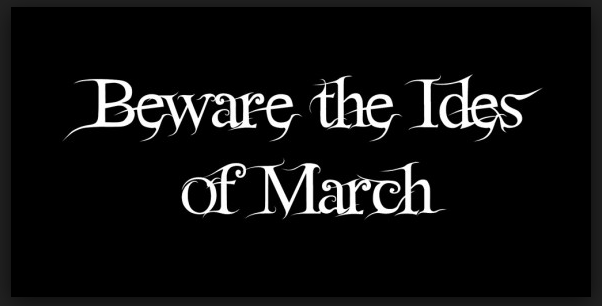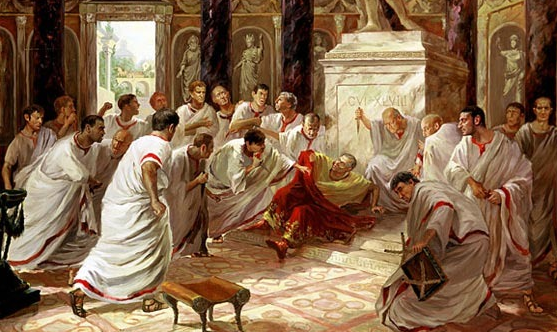
By Margueritte Peterson
Have you ever heard anyone say “Beware the Ides of March”? I have known this phrase my whole life, and even known that it speaks of March 15th. However, I have never truly known the whole story behind the Ides or why it was something akin to a Friday the 13th – a date to be feared and treated carefully. So what began a public fear of this date? Is it something we should truly beware? Allow me to answer your questions!
The Ides of March was a date in the Ancient Roman Calendar. Their years used to begin with what we now know as the month of March, and the holidays celebrated within the month are commonly regarded as different New Years celebrations. “Ides” happened every month, however, as they were an observance of the full moon and usually on the 13th or 15th every month, and March was just one of the many. That being said, you don’t ever hear anyone say “Beware the Ides of September” – do you? So what happened to bring March’s Ides into question? Well, the assassination of Julius Caesar, and a pithy and dramatic line from none other than William Shakespeare, of course!
 Caesar was, according to legend, warned by a seer to “Beware the Ides of March”. This was followed by Caesar throwing it gently back in the seers face while on the way to the Theatre of Pompey in 44 B.C. on March 15th, when he joked that the Ides of March had come and nothing bad had happened, and the seer replied with “Aye, Caesar; but not gone.” – meaning that the worst was yet to come. Caesar was then assassinated by almost 60 conspirators led by Brutus and Cassius at the meeting of the senate – an event which sparked civil war and led to the creation of the Roman Empire and dissolution of the Roman Republic. Shakespeare, a master of creating phrases that live on in the minds of his audience, must have known that by dramatizing such a famous occasion he would be inducing a world of fear surrounding the 15th of March! But is there any truth to the fear? Well, take a look yourself! Here are what the Smithsonian deems the top 10 events in history that took place on March 15th that coincide with the fear of the day.
Caesar was, according to legend, warned by a seer to “Beware the Ides of March”. This was followed by Caesar throwing it gently back in the seers face while on the way to the Theatre of Pompey in 44 B.C. on March 15th, when he joked that the Ides of March had come and nothing bad had happened, and the seer replied with “Aye, Caesar; but not gone.” – meaning that the worst was yet to come. Caesar was then assassinated by almost 60 conspirators led by Brutus and Cassius at the meeting of the senate – an event which sparked civil war and led to the creation of the Roman Empire and dissolution of the Roman Republic. Shakespeare, a master of creating phrases that live on in the minds of his audience, must have known that by dramatizing such a famous occasion he would be inducing a world of fear surrounding the 15th of March! But is there any truth to the fear? Well, take a look yourself! Here are what the Smithsonian deems the top 10 events in history that took place on March 15th that coincide with the fear of the day.
1. Assassination of Julius Caesar, 44 B.C.
Conspirators led by Marcus Junius Brutus stab dictator-for-life Julius Caesar to death before the Roman senate. Caesar was 55.
2. A Raid on Southern England, 1360
A French raiding party begins a 48-hour spree of rape, pillage and murder in southern England. King Edward III interrupts his own pillaging spree in France to launch reprisals, writes historian Barbara Tuchman, “on discovering that the French could act as viciously in his realm as the English did in France.”
3. Samoan Cyclone, 1889
A cyclone wrecks six warships—three U.S., three German—in the harbor at Apia, Samoa, leaving more than 200 sailors dead. (On the other hand, the ships represented each nation’s show of force in a competition to see who would annex the Samoan islands; the disaster averted a likely war.)
4. Czar Nicholas II Abdicates His Throne, 1917
Czar Nicholas II of Russia signs his abdication papers, ending a 304-year-old royal dynasty and ushering in Bolshevik rule. He and his family are taken captive and, in July 1918, executed before a firing squad.
5. Germany Occupies Czechoslovakia, 1939
Just six months after Czechoslovak leaders ceded the Sudetenland, Nazi troops seize the provinces of Bohemia and Moravia, effectively wiping Czechoslovakia off the map.
6. A Deadly Blizzard on the Great Plains, 1941
A Saturday-night blizzard strikes the northern Great Plains, leaving at least 60 people dead in North Dakota and Minnesota and six more in Manitoba and Saskatchewan. A light evening snow did not deter people from going out—“after all, Saturday night was the time for socializing,” Diane Boit of Hendrum, Minnesota, would recall—but “suddenly the wind switched, and a rumbling sound could be heard as 60 mile-an-hour winds swept down out of the north.”
7. World Record Rainfall, 1952
Rain falls on the Indian Ocean island of La Réunion—and keeps falling, hard enough to register the world’s most voluminous 24-hour rainfall: 73.62 inches.
8. CBS Cancels the “Ed Sullivan Show,” 1971
Word leaks that CBS-TV is canceling “The Ed Sullivan Show” after 23 years on the network, which also dumped Red Skelton and Jackie Gleason in the preceding month. A generation mourns.
9. Disappearing Ozone Layer, 1988
NASA reports that the ozone layer over the Northern Hemisphere has been depleted three times faster than predicted.
10. A New Global Health Scare, 2003
After accumulating reports of a mysterious respiratory disease afflicting patients and healthcare workers in China, Vietnam, Hong Kong, Singapore and Canada, the World Health Organization issues a heightened global health alert. The disease will soon become famous under the acronym SARS (for Sudden Acute Respiratory Syndrome).
Now, though I am not at all convinced that the cancelling of the “Ed Sullivan Show” deserves to be on a list alongside the disappearing Ozone layer or the assassination of Julius Caesar (no matter how popular it was), but I’ll bite. It certainly seems like some tragic world events have taken place on this day in history. Then again… tragic events take place every day in history. What about the 26th of December, 2004, when 280,000 people died in the Indian Ocean earthquake and tsunami? Or the September 11th, 2001 attack on the World Trade Center in New York? What about every school shooting, sinking ships, genocides around the world? Surely other days could be found that have known numerous tragic events, just like the Ides of March, throughout history.
In any case, perhaps it is best to keep your wits about you today, and hope that all turns out well! What do you believe?


